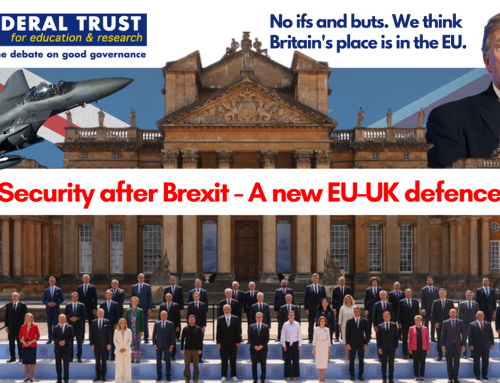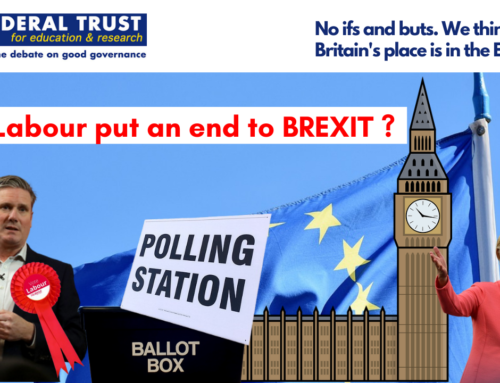In 2001, the late, great former Labour Foreign Secretary, Robin Cook, was President of the Party of European Socialists.
The start of his period of office coincided with the heyday of British influence in Europe, a time when strong alliances were being built by Labour at every level – inter-governmental as well as at the level of civil society and political parties.
This process of “step change” in Britain’s relations in Europe, was ably facilitated and coordinated at the time by outstanding civil servants such as Sir Colin Budd and Sir Stephen Wall. For a while, it transformed Britain’s image and the UK’s place in Europe.
By the end of his period of office, Robin Cook had resigned as Foreign Secretary (over the decision to go to war with Iraq). Europe had fallen out of love with Tony Blair over the consequences of that decision and the events leading up to it and the UK’s European star had begun to lose its shine.
There was still a long way to go before Britain’s reputation in Europe and the world reached the level it flounders at so ignominiously today. But that is another story.
Robin Cook defined European identity as “the values of the French revolution: freedom, equality and solidarity”. He understood that a modern British identity and the European values he held so dear were two sides of the same coin. For him and others like him, it was not only possible to feel British and European at the same time, it seemed natural to do so.
Twenty years later, Britain is on the verge of leaving not just the EU but even the Council of Europe, the family of European nations, for which the pre-condition of membership is signing up to the (British-authored) European Convention on Human Rights.
This atavistic journey into a darkened wood will reach its next staging post when Britain ends freedom of movement at 11pm on 31 December – a crossing of the Rubicon.
Anti-migrant rhetoric was leveraged in the referendum, so it is not surprising that free movement is to be sacrificed on the High Alter of a Hard Brexit. But don’t forget there are non-EU states such as Switzerland which do enjoy freedom of movement with the EU.
How did Britain slide so fast and so far away from the heart of Europe?
The paradox is harder to fathom when we remember Britain’s role in the making of modern Europe. In fact, today’s EU was inspired not so much by the eloquence of Labour Foreign Secretaries as by the foresight of two Conservative Prime Ministers.
Winston Churchill understood that in order to prevent war, it was necessary to create what he described at the time as a kind of “united states of Europe.” Margaret Thatcher saw the need to take down non-tariff barriers which led to the creation of a single market.
These non-tariff barriers (product specifications, for example) together with actual tariffs, will return (in abundance) if Britain leaves the EU without a deal on 31 December.
If there is one take away for pro-Europeans from Britain’s decision to leave the EU, perhaps it is this: It is no longer enough for the EU to be a union of “nations and states”, of “markets (and money)”. The EU also needs to be a union of citizens.
Contrary to myths pedalled by nationalists and extremists, a union of citizens does not need to entail the end of nation states.
A transformation of the way democracy works is needed at every level of the EU. Citizens, cities, and civil society demand the space to participate in the shaping of Europe’s future. This is about setting the agenda, crowd-sourcing innovative strategies and new approaches, and it’s about policy implementation and consent. We are not talking about a revolution.
There also needs to be a much greater role for the European Parliament in European decision-making. The Spitzenkandidaten process needs to be made to work so that the winning coalition in the next European parliamentary elections is able to name the next President of the Commission. Transnational lists of candidates from across Europe would be also do much to strengthen the European alongside the national and local framing of decisions.
There is scope for enhancing the role of national parliaments in EU decision-making. Cities and regions play an increasingly important role as crucibles for developing sustainable models of economic development, often with the direct involvement of citizens.
As a result of the pandemic, big change is on the way in Europe. Many policy objectives that seemed like an impossible dream a year ago have already been realised. There is to be a doubling of the European budget. It is now possible for the European Central Bank to issue Eurobonds to finance investment in member states. There will be a European Health Union.
What we need now is a “step change” in the involvement of citizens in Europe. Citizens have been at the frontend of the fight against the pandemic. We have changed our attitudes and behaviour to accommodate the need to protect our health and others.
Health workers, volunteers, care workers, cleaners, delivery drivers, all the people who have kept life going during the pandemic have earned their seat at the table. They must be allowed to join the conversation about what comes next in Europe.
Such is the focus of the promised Conference on the Future of Europe as well as citizen-led initiatives such as Citizens Take Over Europe and Europe Future Fringe.
It is a shame that Robin Cook but also other great British Europeans over the years are not around to help shape these changes as part of the team that will rebuild and renew Europe after its current trauma.
Instead, the world has to witness the spectacle of an ideologically-driven, dangerously incompetent Government losing it grip not just on events but also, it seems, on reality.
In a famous speech to the Social Market Foundation in 2001, nick-named the ‘Chicken Tikka Massala’ speech, Robin Cook said this about Britain’s favourite “oven-ready” meal:
“It is a perfect illustration of the way Britain absorbs and adapts external influences. The sauce was added to satisfy the desire of British people to have their meat served in gravy.”
Sadly the best cooks in the world have not been able to satisfy the desire of the present British government to “have its cake and eat it.”
We all want our own nation to be the best – that is called patriotism. We all want our own team to win at football. That doesn’t have to make us hate or look down on our opponents. Too many members of the current British cabinet have an air of superiority in their behaviour. They think they can tell other governments what to do. But always trying to get your own way at others’ expense is not the European way.
Europe is the land of compromise, of mutual respect and understanding. That’s part of the European identity – like freedom of movement, which 84% of Europeans in a recent Eurobarometer survey said had contributed to the success of European economies.
The story of Europe is not just a story about states and markets. Above all it is a story about people, people who came together after the war to build a better future together. People who recognised that the holocaust and the two World Wars, meant that their destinies were now intertwined. We and they have made a success of it.
Perhaps, when this destructive phase of the UK’s history has run its course, more British people will see the EU in a different light. A new perspective would mean understanding that the EU is not just a community of interests but also a community of values. Values such as freedom, equality and solidarity.
If British people find they can identify with these values just as much as they like to eat chicken tikka masala we will all be in a better place.
Until then British people will continue to be embarrassed and betrayed by the actions of its government. A government whose idea of serving the national interest is to try to flout the club rules (while retaining the privileges), even though it is no longer a member.





